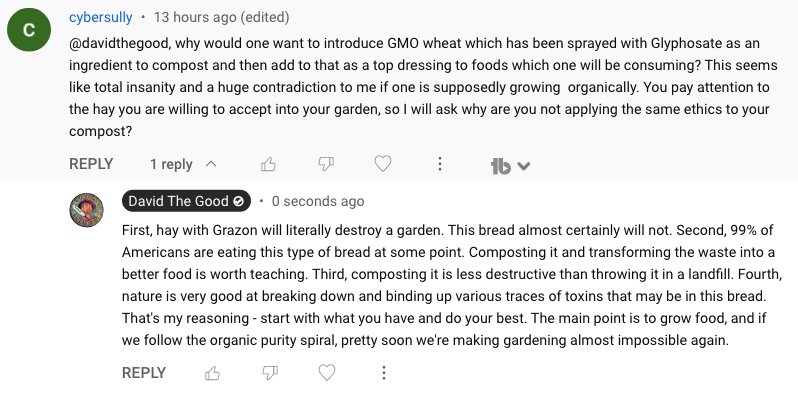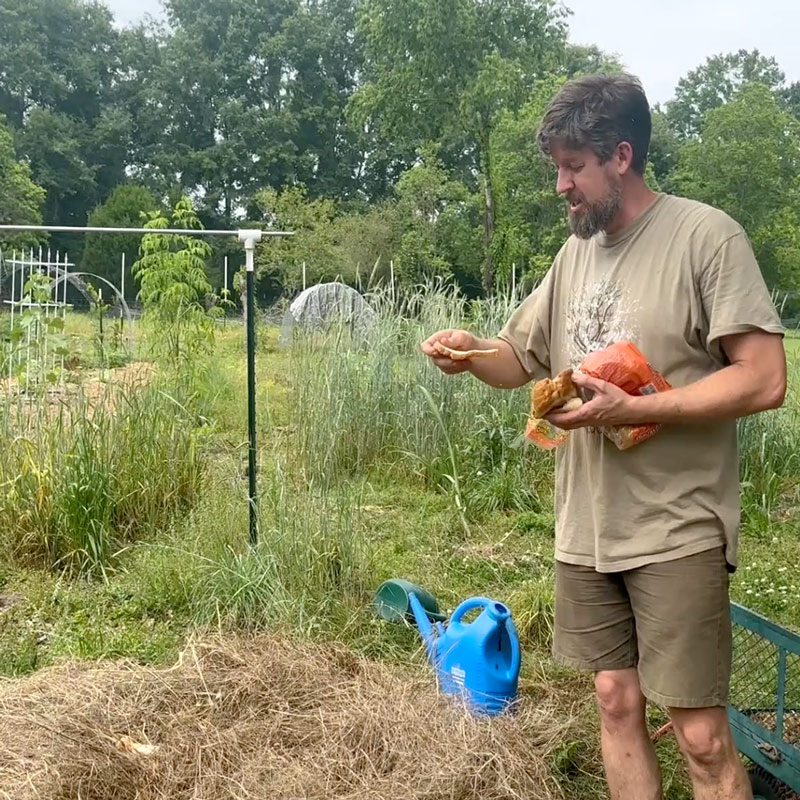A commenter takes exception to my giant bread-filled compost pile:
“@davidthegood, why would one want to introduce GMO wheat which has been sprayed with Glyphosate as an ingredient to compost and then add to that as a top dressing to foods which one will be consuming? This seems like total insanity and a huge contradiction to me if one is supposedly growing organically. You pay attention to the hay you are willing to accept into your garden, so I will ask why are you not applying the same ethics to your compost?”
I responded:
“First, hay with Grazon will literally destroy a garden. This bread almost certainly will not. Second, 99% of Americans are eating this type of bread at some point. Composting it and transforming the waste into a better food is worth teaching. Third, composting it is less destructive than throwing it in a landfill. Fourth, nature is very good at breaking down and binding up various traces of toxins that may be in this bread. That’s my reasoning – start with what you have and do your best. The main point is to grow food, and if we follow the organic purity spiral, pretty soon we’re making gardening almost impossible again.”

My “ethic” on growing food and composting is to, first of all, grow food to feed your family.
If you can’t scavenge for materials to make compost because you’re terrified that they might have some pesticide residues in them, you’re going to be in a bad place. If you are scared to till, so you make a tiny little no-till garden that feeds almost no one, then you are in a bad place. If you are afraid of all chemical fertilizers so you try to only use compost when you don’t have near enough compost, then you are in a bad place.
Grow food first. Even a conventional sprayed garden in a backyard is better than a huge, conventional farm far away, with produce that is transported thousands of miles and handled by unknown people in unknown ways, and then, after aging for too long, is purchased in plastic bags at your local supermarket.
You really can get stuck in an organic purity spiral.
I don’t like GMOs, pesticides, herbicides and other evils, but we have to work with what we have.
And when life gives us a pile of factory bread, we compost it.
My line is drawn at spraying chemical pesticides. We do not do that in our gardens, since we don’t want to eat produce that has been sprayed with poison. The entire idea makes me sick and strikes me as true insanity.
Consider This
When I till a garden large enough to feed our family, I am told we should never till
When I make compost, I am often told it’s the “wrong way”
When I use deep mulch, I am told that “deep mulch attracts slugs and bugs”
When I use commercial fertilizer I am told I’m poisoning my garden
When I used supposedly “organic” manures I really did poison my garden, killing most of my plants
When we use cardboard as a weedblock, we’re told that there are toxins in cardboard
When we use plastic as a weedblock, we’re told that plastics will destroy the earth
When we capture rainwater we’re told it’s contaminated by the roof, the barrel, or by planes spraying poison in the sky
When we don’t capture rainwater we’re told we’re being wasteful and “why in the world would you use city water???”
Obviously, the answer to all of this is to quit gardening, right?
No. Just do your best with what you have, and works towards being a good steward of the land you have. You’ll never please everyone, and you’ll never do anything at all if you listen to all the opposing voices.
Grow food the best you can and let God sort it out.


11 comments
Amen.
(clapping) this is me giving you a standing ovation!
we gardened for decades using 10-10-10, its the way we were taught by our parents in the 50s, 60s and 70s. About twenty years ago I started to notice a lot of articles about the damage that commercial 10-10-10 was doing to environment. Its the same with exotic ornamental. People didn’t have the knowledge that it would become problem in the future. Hindsight is always 20/20.
Thank you, Gidget.
Exactly! I compost cardboard rather than having to throw it in the trash (no local recycling). I do slow composting because I’m getting older and have to use my energy for other things. I don’t worry about weed seeds sprouting, I just put them back in the compost – I consider weeds to be another harvest that I can use in my compost. It’s like people have been conditioned to be afraid of every possible risk.
The compost puritans provide us with an excellent example of the saying “perfect is the enemy of good”. Better to be imperfect but good as a gardener, instead of being unable to garden at all because foraged materials are not perfect.
I love your philosophy of “Garden using common sense” – just as some folks thrive on controversy and garden drama promoting the latest eco-craze while condemning all who disagree, you tend to focus on simple and effective ways to grow food. Do what works for you, in your climate, with what you have to work with. Any food you grow for yourself is a win. Oh, almost forgot, I have an IBC tote to raise tilapia for your aquaponics set-up that will take your gardening to the next level! They make great fertilizer once the inevitable happens :)
Dave: I’m a relative newbie with a small suburban garden and am trying no till, but in my raised beds, I don’t think it is the same issue as for you. I have seen other sites claiming that they actually no till farm a number of acres with great success (I think this was in the north east) and I’m wondering if you have tried a small plot this way and it wasn’t successful, or you just think its a waste of time. Since you are working on a much much larger scale that I am, I’m just curious about that part. The rest, I agree. Keep posting. Laura
Lots of farmers and ranchers are using regenerative agriculture, such as Gabe Brown (see his book Dirt to Soil, it’s great). I’m doing an experiment with that style in my garden this year, so if you like it you should try it.
For the garden scale, there’s definitely a place for both tilling and not tilling. They’re just tools in the toolbox, not ends in and of themselves.
It’s extremely difficult to pull off without either a huge source of mulch, or expensive machinery.
I appreciate your sensibilities. Keep up the good work!
I believe you did awesome with your bread compost. Think of all the organism you fed as they converted all those carbohydrates into plant food. I will say that the neighsayer in this event did have me wondering if herbicides sprayed on the wheat could possibly make its way into the flour. I guess we find out in the future. Better to do what you did even in the off chance grazon miraculously made its way into the bread we get to find out when that compost hits the garden bed. If I was a gambling man I would bet it’s all safe.
Comments are closed.